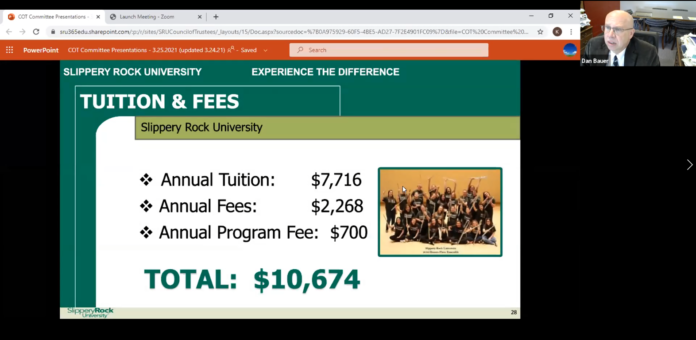Students studying music at Slippery Rock University will be required to pay a $700 fee starting in the fall to help offset the cost of one-on-one instruction.
SRU’s Council of Trustees passed the measure with an 8-3 vote Thursday afternoon, despite some trustees objecting that it was not a good time to charge students more fees during a pandemic.
Addressing the council, trustee Robert Taylor said he believed the state system was in its current position because of many minor missteps. Adding the fee during a pandemic is contributing to the problem, Taylor said.
“The system’s in trouble because of a death of 1,000 cuts,” Taylor said. “And I think a fee like this just adds to the bleeding.”
Taylor added that those advocating for the new fee were receiving steady income and not in the position of waiting for an unemployment check like some families that currently cannot afford to send their child to SRU.
“It’s absolutely the most incorrect time if you truly believe that COVID has taken its toll on people who are the most economically challenged in our country and in our Commonwealth,” Taylor said.
Robert McCarrier, trustee and chair of the finance committee, said the council is aware of the hardships students face. Still, along with a responsibility to the students, the council also has a duty to keep the university financially sound, he said.
“There’s a financial crisis there, and this is one small way that we can offset this financial crisis,” McCarrier said.
The music program fee will cost students $350 a semester and bring the total tuition cost of music majors to $10,674, according to Danny Bauer, dean of the College of Liberal Arts.
Bauer projects the college will receive about $91,000 a year from the fees alone. The increase in revenue and cost-savings from restructuring at least 15 sections that will now be offered every other year will save the university an estimated $239,000. According to the council’s documents, even with an estimated 25% increase in net revenue, SRU’s music programs will continue to operate at a loss of more than $730,000 a year.
Samantha Hawk, secretary of the Council of Trustees and student trustee, said she had taken music lessons before and that the cost of roughly $25 per hour per student is well below what one would pay for private lessons.
“I think the fee compared to if we cut these private lessons … is the most cost-effective measure for students in terms of getting that required training,” Hawk said.
The music program fee will be the third major-specific fee the university has adopted. The engineering program has an $80 per credit hour fee, and the bachelor of fine arts acting and musical theater major charges a fee of $480 per year.
Compared to Indiana University of Pennsylvania (IUP), SRU’s music programs are $2,444 cheaper and the least expensive, compared to other neighboring universities including West Virginia University and Youngstown State University.
Along with Taylor, trustees Suzanne Vessella and Jeff Smith voted against the fee.
The council also approved the capital budget for three projects that will renovate the Morrow Field House, McKay Education Building and the Eisenburg Building. The council had previously approved those projects back in 2015 and 2017 but needs yearly approval by the council to hold their place for state funding.
The budget, approved with a 9-2 vote, will cost more than $65 million combined. Work on the projects is not expected to begin until 2025.
Taylor and Vessella voted in opposition to funding the projects because of the music program fees approved earlier. According to Taylor, capital projects like Miller Auditorium were supposed to increase enrollment in underperforming programs in order to reduce losses, but now see programs subsidized by the students with added fees.
“I don’t want to vote for the capital budget … because that means we’re going to have to put a fee on the kids that play basketball and Morrow Fieldhouse, eventually,” Taylor said.
The council removed the donor naming policy guidelines from the agenda so the committee could have more time to finalize the language. That proposal is expected to be brought before the council’s next meeting on June 3-4.
When the council meets in June, it will meet in-person for the first time since the pandemic shut down the university last spring. Before the regularly scheduled meeting, the council is expected to meet for a special session to vote on new meal pricing plans.
The new pricing is due to a vendor switch. Aramark will take over dining operations from AVI in a contract that will include SRU, IUP, Edinboro and Clarion Universities.
The contract will reduce the number of meal plans offered from 12 to 7 but will not increase costs for some meal plans and lower costs for others.
Aramark’s contract is for seven years and begins June 1.








